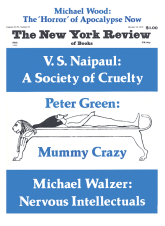In response to:
Letter from 'Manhattan' from the August 16, 1979 issue
Allen's Alley from the June 29, 1978 issue
To the Editors:
What piques screenwriter Joan Didion so much about those large, enthusiastic audiences Woody Allen gets is that they seem to recognize themselves in lives that Didion finds unimportant. People who live such lives are unimportant to Didion because they “go to restaurants and ask one another hard questions” about “relationships,” something only “adolescents” still discuss much. Evidently where Joan Didion lives problems of love and psyche evaporate in a haze of margaritas by age twenty-one and folks can get down to the real business of living—which is what, by the way, if it isn’t the self or others? Losing weight? More likely, it’s vocations. Careers. Movie deals.
Didion complains that Woody Allen is stuck in the “fairly recent” notion of finding or making or inhabiting the self, as a central obsession. She’s right that it’s recent: those who trace it back to Augustine are exaggerating, a little. But surely the literature of “recent” centuries is richer for the works of people who’ve made this same faux pas. It’s what modern narrative art is mostly about, and Didion is sophomoric (“adolescent?”) in complaining that Woody Allen hasn’t managed to rehabilitate pre-modern modes of being, such as “attaining grace.” Didion would make a vice out of the fact that Woody Allen keeps to the side of the street he knows best—the sign of a tyro, by the standards of Hollywood, where a “writer” is someone who can dish out visions of the Gold Rush, the Boxer Rebellion, or the Lower East Side with equal competence. She calls the narrowness of Woody Allen’s focus “self-absorption.” Another word for it is modesty.
Admittedly there’s nothing modest about the list of things he lives for in Manhattan, but that’s not what Didion doesn’t like about it. Instead she notes that it’s “modishly eclectic,” which is a too deft way of saying that the list isn’t governed by any particular fashion or set of fashions. Here Didion’s need to attack the mindlessly modish audience (for roller-skating in crumpled linen, is it?) overcomes her intellectual honesty. The “Jupiter,” as she knows, is not at all a stylishly unfamiliar symphony—I think I’ve heard it in the Park—nor is a passion for “Potato Head Blues” likely to win you fancy friends. Didion may resent Woody Allen’s public display of his connoiseurship—and a (gorgeously) indulgent scene it is, too—but she shouldn’t pretend she knows his tastes to be modish when she can’t, because they ain’t. For instance: she says that the point of listing Sentimental Education is to obviate a gauche reference to Madame Bovary. A subtle discrimination, indeed! To know which of these two novels is hipper than the other betrays a suspiciously keen eye for what’s in, what’s out. Keener than Allen’s.
Which brings me to his defense on one last point, and here I’m answering not only Joan Didion, but also my friend Michael Wood, who in these pages [NYR, June 29, 1978] made the point that Allen doesn’t know as much as he implies about the bulk of his literary references. Probably there’s truth in this; that bulk is rather large. But when an allusion is apt—and even illuminating—it deserves credit even from the knowing. And the concerns of Sentimental Education have an eerie relevance to the concerns of Manhattan. In Frédéric Moreau as in the character Woody is endlessly playing, strength of feeling isn’t a source of action but rather an enfeeblement. By reminding us of the barely sympathetic, weak Frédéric, Woody Allen is reinforcing not the central character but those others in the film (or in the audience) who doubt his strength, his maturity, his authenticity. To say that this similarity in the themes of the two works is just accidental might be quite correct, but it would also be an instance of not crediting on the screen what we wouldn’t hesitate to find—and maybe praise—in a flawed but intelligent novel.
John Romano
Columbia University, New York City
Joan Didion replies:
Oh, wow.
This Issue
October 11, 1979



